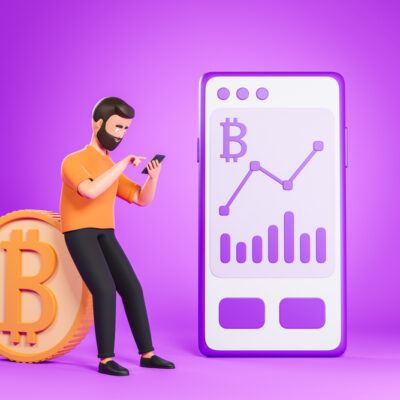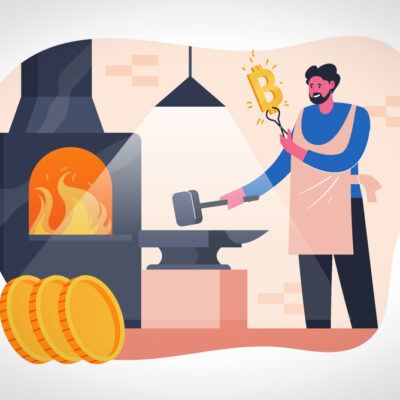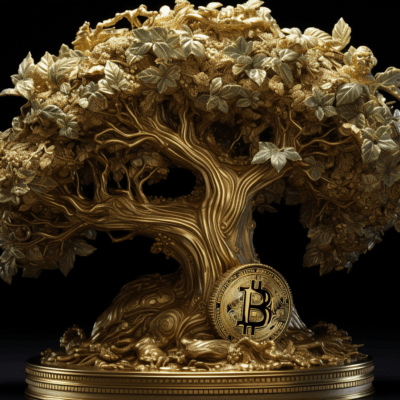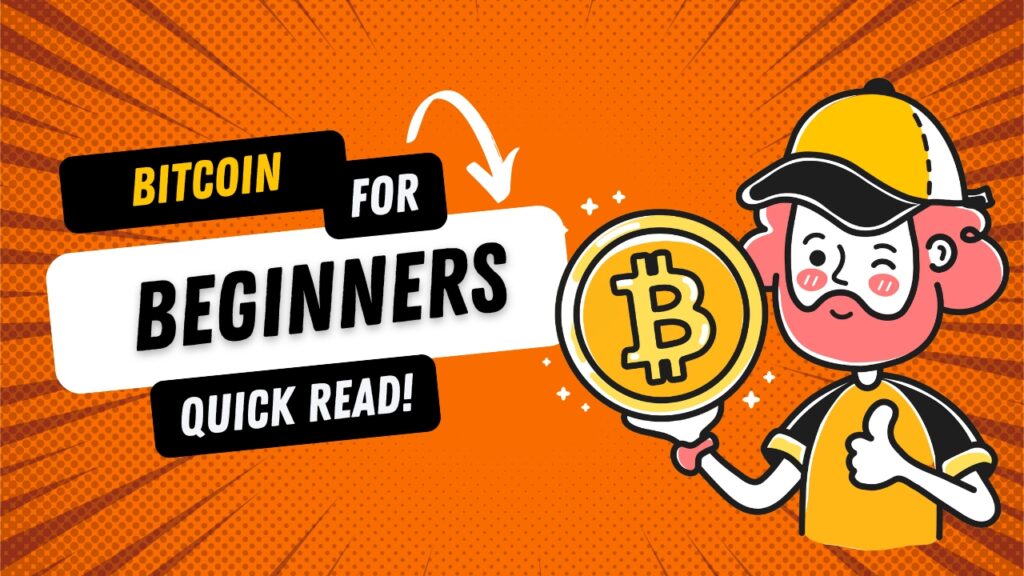
They say that Bitcoin is the future. It’s the native currency of the internet. We’re moving to a Bitcoin standard. It’s going to be the global reserve currency. You’d better get in the rocket ship before it takes off… But do you need to own Bitcoin? Is this a must-have thing?
I think it depends on how you define the word, “need”.
For example, I think owning Bitcoin is probably not going to be a life or death situation for most people. It’s not likely that the world is going to fall into some kind of global economic catastrophe where we’re all trading Bitcoin for water just to survive.
In that sense, there’s no urgent need to buy Bitcoin right now. If you don’t own bitcoin, your life will go on as usual. If a situation arises in the future where you need Bitcoin to buy something, you can just hop on an exchange and buy it in 10 minutes.
On the flip side, if you are trying to save money for the future, you actually do need some Bitcoin. Inflation is destroying our savings, so it’s forced everyone to become an investor in order to protect the purchasing power of our earnings. All assets have tradeoffs, and bitcoin is one asset with some pretty attractive qualities.
You can buy bitcoin instantly anywhere in the world and start with very small amounts. You can start with $10 or $100 worth of Bitcoin and buy it using a wide variety of apps immediately available on your phone. It’s cheap to store, easy to transfer, trades 24/7 globally, and has growing merchant adoption.
5 Reasons You Need To Own Bitcoin
1. Things Are Going To Get More Expensive In The Future
Your savings are being inflated away at 2-3% per year. That may seem like a very small amount, but it has a compounding effect over decades. What you end up with is losing 50%, up to 90%, of the purchasing power of your money that you earned in your younger years. Money you earned in your 20’s is worth almost nothing by the time you retire.
What that means is that you have no choice but to invest your money into assets other than cash.
Whatever asset you choose to invest in, that asset needs to gain at least 2-3% on average, every year, in order to keep up with inflation.
2% Is The Best-Case Scenario
That 2-3% is an average over a period of time. It’s also a measurement of a specific basket of goods selected to be in the CPI, which supposedly represents the cost of living for the average American. Some months or years may inflate at different rates, and other goods or services may have a different rate of change. Additionally, inflation will be different in other countries.
For example, the cost of buying a home in some areas may increase 10-20% per year, and the CPI in May ’21 for the US was over 5%.
Whatever the specifics may be, you can absolutely expect that things are going to get more expensive in the future. If you want to retire with a nice, comfortable life where the luxuries you enjoy are affordable, you need an investment plan to retain the purchasing power of the money you earned when you were younger.
Related Content
2. You Don’t Have Time For Stocks
Investing in stocks is one common way that people grow their wealth over time. You can invest in “baskets” of high-quality stocks through ETFs and index funds, or pick individual stocks based.
The issue with picking individual stocks is that it exposes you to a lot of risk and you have to be aware of those risks. For example, you need to be aware of the industry as a whole and whether or not that industry is expected to grow in the future. You wouldn’t want to put your money into Sears right as Amazon started to take over, and you wouldn’t want to put your money into Sirius XM just before Apple released Apple Music streaming directly from the iPhone.
Even within successful sectors, you have to be able to pick “winners”. A company’s product or service must be successful and continue to be successful over and over again. You need a competent team from top to bottom to make a company successful. If you bought Microsoft in 1999 and held it for 15 years, you’d have nothing to show for it despite the tech revolution happening that entire time. If you purchased Blackberry stock when they had their super popular phone and held it until now, you’d have lost money even though the smartphone industry multiplied more than 100x since then.
Making money from individual stocks requires a lot of skill and timing.
What About ETFs?
Index funds and ETFs are not a bad investment strategy overall, but there still are some downsides. Now (2021), we’re in a situation where the stock market is near all time highs and has gone an unusually long time without a correction. The profitability of US companies seems to be somewhat dependent on borrowing money at cheap rates.
Plus, the stock market only trades Monday to Friday for a few hours during the day, and you can’t peel off a bit of your Vanguard S&P 500 index fund to pay back your friend (as you can with Bitcoin). In that sense, Bitcoin is more accessible and more versatile.
3. You Can’t Afford Real Estate
Real estate can be a great investment. You only have to put down 20% of the value of the home in many cases, and you can borrow the rest for cheap. Having a renter basically pay down the mortgage means that you’ll not only benefit from price appreciation of the home, but could be receiving monthly cash payments from the rent. Buying and flipping is more of a business strategy that requires time and strategy to execute, so I won’t go into that.
There are some clear issues with that strategy that need to be considered though.
Firstly, you need a rent price that outpaces the mortgage, taxes, insurance, and cost of repairs. That means you need to do a lot of research. You’ll also need to live in an area where this ratio of rent-to-mortgage works in your favor, so location may be an issue.
Additionally, in terms of location, and assuming you have the skills necessary to perform repairs, you’ll need to be close enough to be nearby and ready to fix things like toilets, stoves, and other small things. Contractors will be needed for larger issues like needing a new air conditioner or water heater, and roof repairs. All of those costs need to be calculated into the rent price.
The Problems With Real Estate Continue
The list of potential problems with rentals doesn’t stop there. In some places, if renters stop paying rent, it can be time-consuming to go through the legal process of having them removed. If they trash the place on the way out, you’ll have to pay for that too. Plus, if you don’t go through the proper process during any step of renting the place out, you could face legal trouble – yet another cost to consider.
Then, even if you decide to take on all those potential problems (all investments have pros and cons!), you still need that 20% down payment to even start. While you can get a 0% down FHA loan for first-time home buyers, you can’t get that type of loan when buying property for investment purposes. In some cases, banks may even require 25% down!
For a $200,000 investment property, you’d need to come up with $40,000-$50,000 for a down payment. This down payment could vary a lot, but even a relatively cheap property that costs something like $100,000 and requires fixing up to get into good shape for renting, you’d still need $20k to start, and then you need cash to pay for the repairs. You’ll also be responsible for the mortgage for a couple of months while repairs are being done on the place.
When you decide you finally need access to that money, selling a property can take months. Plus, you are going to pay fees to the real estate agent. Until then, your cash is locked up in that property. You could do a cash-out refinance, but that’s going to change your ratio of rent-to-mortgage costs, and will still take 30-60 days to get approved and close on the new loan.
4. Gold Is Hard To Verify Buy, Store, Move, And Use
In the investing world, gold is typically thought of as an inflation hedge. The issue of losing 2% value per year by holding cash could be mitigated by holding gold. Since gold is a limited resource and takes work to produce more (by digging it out of the ground) it tends to retain its value over time as compared with cash, since you can print more money with the stroke of a key (requires no work!).
Makes sense, right? Something that is hard to produce is worth more than something that’s easy to produce!
Gold has issues worth considering though.
Buying Gold And Storing It
For one, you must decide whether to hold real gold or paper gold. Real gold is physical gold. You buy it in a store or have it shipped to your home, which is an additional cost of acquisition and ownership. Now you need a safe place to store it, further adding to your cost of ownership.
For a small amount of gold, maybe a safe from Costco or Amazon would work, while for larger amounts of gold you probably want to get something much more robust. A cheap safe may cost you a few hundred dollars and won’t do much to protect you from actual thieves, while a legit safe may cost $5,000-$10,000 or more.
Buying paper gold isn’t really buying gold. You may track most of the price movements of gold, but ultimately the value you gain from owning the asset isn’t based on the true nature of the asset, which is the scarcity and verifiability. Are you absolutely sure those paper claims on gold are connected to a real gold bar somewhere?
Let’s assume you buy and hold your own gold. Are you sure it’s real gold? To verify, you need to have it professionally assayed. Now your costs are really stacking up.
Gold Is On The Decline, Bitcoin Is On The Rise
What if you actually want to use your gold to buy things? You can’t really buy stuff with gold, so you need to exchange it for dollars, and selling your gold comes along with costs as well. To sell it, you need to find a quality dealer who will give you a fair price.
Compare that with Bitcoin, where you can buy it instantly on a variety of exchanges. Apps are free to download to store your Bitcoin. If you want to store it using the most secure offline cold storage method, then you can buy a hardware wallet for $150. Bitcoin is easy to verify since invalid Bitcoin would simply not be accepted by the network, but if you really want to verify your own transactions you can build a node for $200 and connect your wallet to your node.
You can buy and hold Bitcoin, then purchase goods and services at any time. It’s way faster to exchange for dollars, or you could buy gift cards with it. There is always year-on-year growth of companies accepting bitcoin. The same is not true of gold.
Since Bitcoin is a scarce asset, it is often called digital gold, yet at the same time it’s cheaper, easier, faster, and more widely accepted than gold.
5. Future Monetary And Fiscal Policy Risk
Regarding your wealth, there are many imminent risks to consider when it comes to government fiscal policy and central bank monetary policy. When I use the term “wealth”, I suspect a lot of people think that because they are not wealthy, they don’t have wealth. However, wealth is simply the things that you own save. You don’t have to be wealthy in order to have some amount of wealth saved for the future.
How do you save for your future? The risk here is that your chosen method of savings could be put at risk by future policy decisions made by central banks or governments.
Saving In Cash Is Subject To Debasement
You may hear from some Bitcoiners that the dollar is going into hyperinflation and you are going to need Bitcoin as a life raft. Without Bitcoin, you’ll be on the street, begging for just a few sats!
I doubt this is going to happen.
Hyperinflation of the dollar is not on my bingo card of reasons why you need Bitcoin. The key here is that not all of you reading this are using dollars. Insane inflation rates for other currencies which are not a global reserve currency and are not the exclusive medium exchange for oil around the globe is a real risk.
Venezuela is an extreme example, as they are currently experiencing over 2,000% inflation.
There are currently 20 countries around the world that have their local currencies losing purchasing power at a rate of 10% per year or more, including Lebanon which is more than 100% yearly inflation, and Argentina, which is currently at 50%. This means that some people are losing the value of their entire life savings in just a few years or less.
The risk of monetary debasement is much greater in non-US jurisdictions because the global reserve currency is the US dollar. The USA is able to print more money and the excess is absorbed by the exportation of dollars to places carrying dollar-denominated debt.
Even so, the US dollar is still being debased. It’s certainly no secret that you cannot “save money” in cash any more. If you want to beat inflation, you absolutely have to be investing in something.
Hard Assets Have A Cost To Ownership
Real estate is an extremely popular way to save for the future. Everyone knows that real estate “always goes up over time”. It’s a safe investment! However, real estate comes with its own set of headaches and risks.
Its benefit is also it’s crutch. Real estate is valuable because you cannot simply “make more houses” in the same area. There’s only 1 of 1 houses exactly in the same spot. It’s unable to be moved. However, that also means it’s easily taxed, visible, and subject to public scrutiny.
Real estate ownership is one of the most easily detected signs of wealth. Want to find some rich people? Simply go to where they live.
I remember during the early 2020’s when people were losing jobs and many local or state governments enacted a “rent moratorium”, meaning tenants didn’t have to pay rent. Though these policies were limited to certain areas and limited to a certain amount of time, it’s not hard to imagine a future where this idea becomes more popular.
If you are a real estate owner, changes in local, state, and federal laws regarding your investment is a real risk to consider. If you own real estate, I think bitcoin ownership is a must as a hedge because its ownership properties are quite different than real estate.
Bitcoin is easy to securely self custody private, and can be transported just as easily. Of course, bitcoin ownership still has its own individual risk profile, but much less so on the local and state side of things.
You Probably Don’t Need Bitcoin As Long As…
If you live in a Western nation and are happy just going with the flow, you probably don’t need Bitcoin.
As long as you have a good paying job with a side hustle as a backup plan just in case the job doesn’t work out, you’ll most likely always have a stable source of income. Assuming you like your job, then you’re set for the next 20 or 30 or 40 years until you retire. You can put a portion of your income in a savings account and just ‘take the L’ on inflation.
As long as you own your own house, and the mortgage doesn’t take up too much of your after tax income, it’s pretty likely that you’ll pay off your house in 30 years without any issues along the way. When you retire, you’ll have a cheap place to live, and you’ll have more expendable income that will offset price increases.
As long as you have confidence that the US stock market as a whole will continue to perform well in the next few decades so your index fund gets at least 7% returns you’ll be fine.
As long as you have a fool-proof retirement plan that takes into account things like inflation, potential job loss, unexpected expenses, downturns in the market, and future medical costs, then you’ve already figured out how to preserve the future purchasing power of your money, and you don’t need to participate in this emerging asset class. There are many types of investments to choose from, and you may feel more comfortable investing in something else!
As long you believe that the US government knows exactly what they’re doing, and that the Federal Reserve always does the right thing, then don’t worry. They’ve got this thing under control. You don’t need any Bitcoin.
If any of those don’t apply to you, then you probably should get a little Bitcoin, just in case. Maybe the worst-case scenario doesn’t play out, but Bitcoin could still be a good place to park your money. It’s not going to zero, so it might just head in the other direction (infinity).
Or Maybe You Should Own A Little Bit Just In Case
Though you don’t need to own any Bitcoin, your kids might. It’s hard to imagine what the future will look like, but I’m confident that Bitcoin is here to stay. The clear advantages of owning Bitcoin over many other traditional types of wealth-preserving assets means that future generations will likely look to Bitcoin as a common store of value.
As the technology improves, we will probably start to see it develop further as a method of payment as well, meaning that you could store your wealth in an appreciating asset AND use it as a medium of exchange. That’s different from today where we store our wealth in things like stock or real estate, then spend dollars in our daily lives.
What will the Bitcoin economy look like in 10, 20, 30 years or more?
What Will the Bitcoin Economy Look Like In 2040?
One of the coolest things about owning Bitcoin is that you benefit from anyone else’s participation in the network. If someone builds an app that helps onboard more people to Bitcoin, you benefit. If people in another country decide to adopt Bitcoin to avoid the negative effects of the inflation of their local currency, you benefit.
When more people join the Bitcoin network, all users benefit. Not just from price appreciation, but from the ability to connect with more users on the network and exchange value with them. This is why many predict that Bitcoin will become the first globally, universally accepted money!
You haven’t missed the boat on Bitcoin. We’re just getting started. Though you can’t go back in time and buy Bitcoin below $1 like the cypherpunk OGs, there’s still the opportunity to buy some before it cracks $100,000.
Don’t worry about the price action of Bitcoin today or even next year. What do you think the price will be in a couple of decades?
Frequently Asked Questions
Do You Need To Own 1 Bitcoin?
No, you do not need to own a whole bitcoin to participate in the network or benefit from owning the asset. You can own a fraction of a bitcoin. Rather than worry about owning 1 bitcoin, focus on how much bitcoin you own as a percentage of your entire net worth.
What Is The Point Of Owning Bitcoin?
The point of owning bitcoin is to preserve wealth in a way that is outside of the legacy financial system. Bitcoin cannot be forged or inflated, there is no counterparty risk, and it’s hard to confiscate.
Can You Earn Bitcoin Without Buying It?
Yes, you can earn bitcoin without buying it. Though not many companies pay in bitcoin, you can use apps like CashApp or Strike to automatically convert a portion of your salary into bitcoin and have it deposited into a bitcoin wallet every time your normal job pays you.
How Much Bitcoin Should I Buy To Start?
There is no universally accepted recommendation for how much bitcoin you should buy to start, but a rule of thumb to aim for could be 1% of total net worth or 5-10% of liquid assets. That may sound like a lot in the beginning, so you should buy relative to your knowledge about the asset. If you are curious, just but a little. If you learned a little bit and like the idea, buy a little more. If you have studied it a lot and are confident in it as an asset, then you can buy even more. How much bitcoin to own is a personal question, so do your own research!
What Do You Actually Own When You Buy Bitcoin
When you buy bitcoin, assuming you deposit it into a hardware wallet, what you own is a private key that allows you access to that specific bitcoin which is recognized by the network as legitimate. You can then send that bitcoin to any other recipient.
One key distinction to consider is that when you buy bitcoin on an exchange, you don’t actually own the private keys (YET!). This means you essentially own a bitcoin IOU, or a ticket that allows you to redeem for bitcoin. If you do no withdraw to self custody, it’s impossible to verify that the bitcoin you “own” is actually there. This is why bitcoiners preach self custody and private key ownership. Not your keys, not your coins!


















 Is Bitcoin A Fad?
Is Bitcoin A Fad?
Leave a Reply